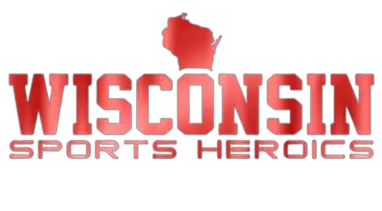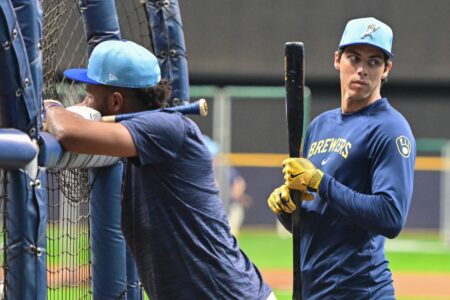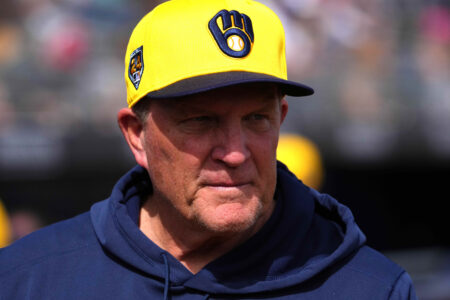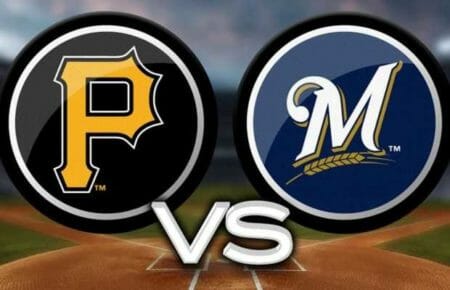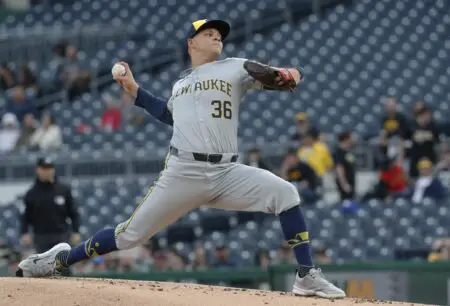Like many teams, the Brewers have brought in players for half of a season or just for one year to provide stability to their roster. Some players used their time with the Brewers to earn longer contracts elsewhere. Others were brought in to help the Brewers succeed in the post season. Still others ended their careers with the Brewers. Read on to find out about the best seasons (or half seasons) of these short-term Brewers.
#1 Short-Term Brewer: CC Sabathia (Half-Season: 2008)
2008 was a magical season for the Brewers. The team found itself in a position at the trade deadline that it had not been in for 26 years: buyers. In an effort to cement their first playoff spot since 1982, the Brewers traded for CC Sabathia, the former AL Cy Young Award winner. In his brief time with the Brewers, Sabathia went 11-2 with a 1.65 ERA and 128 strikeouts. These numbers also include seven complete games and three shutouts.
Unfortunately, Sabathia did not pitch well in the postseason. He gave up five runs to the Philadelphia Phillies in the NLDS in his only start of the series. Sabathia turned down a $100 million contract with the Brewers to sign with the Yankees. Sabathia would win a world series in New York in 2009 and was the ALCS MVP that year. CC spent the remainder of his career with the Yankees, announcing his retirement at the end of last season.
#2 Short-Term Brewer: Dave Parker (Full-Season: 1990)
Dave Parker was already an established star when he signed with the Brewers prior to the 1990 season. He won the NL MVP award with the Pittsburgh Pirates in 1978. He had made six All-Star teams and won three Gold Glove awards. In his only season with the Brewers, he made his seventh and final All-Star team and finished the season hitting .289/.330/.451 with 21 home runs and 92 RBI’s. He finished 11th in MVP voting that year. The Brewers traded him in the off-season for Dante Bichette, who played two season in Milwaukee. Parker played one more year in the Majors before retiring after the 1991 season.
#3 Short-Term Brewer: Willie Randolph (Full-Season: 1991)
Like Dave Parker, Willie Randolph was already an established star at the tail-end of his career when he signed with the Brewers on April 2, 1991. A six-time All-Star, Randolph had one of his best offensive seasons with the Brewers, even though he did not hit a single home run. Randolph finished the 1991 season with a slash line of .327/.424/.374 and 54 RBI’s in 124 games. Also like Parker, Randolph only played one more season in the majors. After the Brewers declined to offer him a contract for 1992, he finished his career with the New York Mets.
#4 Short-Term Brewer: Devon White (Full-Season: 2001)
Devon White had won seven Gold Glove awards and made three All-Star teams before being traded by the Dodgers to the Brewers for Marquis Grissom. White enjoyed a renaissance season in 2001 after missing a large part of the 2000 season with injuries. 2001 saw White return to form as he had a slash line of .277/.343/.459. In addition, White hit 14 home runs while driving in 47 runs to go along with 18 stolen bases. White’s .802 OPS in 2001 was his career-high. He decided to retire after the season, bringing a good end to a 17-year MLB career.
#5 Short-Term Brewer: Drew Pomeranz (Half-Season: 2019)
When the Brewers traded for Pomeranz before last season’s trade deadline, it confused many of their fans. At the time of the trade, Pomeranz was 2-9 with a 5.69 ERA and 1.61 WHIP. He certainly did not seem like the boost the Brewers’ pitching staff needed. However, Pomeranz put together an excellent second half, posting a 0-1 record with 2 saves, a 2.39 ERA, and 0.91 WHIP. As it turned out, Pomeranz was a boost to the Brewers’ pitching staff, providing a reliable arm out of the bullpen. He appeared in the Wild Card game against the Nationals, pitching two innings while allowing no hits or runs and striking out two. Pomeranz turned his second half surge into a 4-year $34 million contract from the San Diego Padres.
The Best of the Rest
Mark Kotsay played for the Brewers in 2011 and was a key locker room leader during their playoff run. He hit .270/.329/.373 in a limited role. He was able to use his 2011 success to garner a two-year contract from the San Diego Padres.
Aaron Hill was traded to the Brewers in the same trade that brought Chase Anderson to Milwaukee prior to the 2016 season. Hill hit .283/.359/.421 with eight home runs and 29 RBI’s in 78 games for the Brewers. The Brewers traded Hill to the Boston Red Sox for Aaron Wilkerson on July 7 of that season. The trade seemed to put an end to Hill’s effectiveness as a hitter. He hit .218/.287/.290 for the Red Sox, who did not bring him back in 2017. He played the first part of the 2017 season with the Giants, but was released half-way through the season with a .132 batting average.
Jerry Hairston Jr. was acquired by the Milwaukee Brewers during their 2011 playoff run to help provide leadership and playoff experience to their roster. Hairston hit .274/.348/.379 in 45 games for the Brewers. In the 2011 NLDS, he had a slash line of .375/.400/.500; in the NLCS, he hit .391/.440/.565. Following 2011, Hairston signed with the Dodgers and spent the last two years of his career there.
Follow me on Twitter at @MrAdams88 and follow us @OTHWisconsin for more great content!
Also, be sure to check out the Overtime Heroics Forums page to join in on the discussion.
